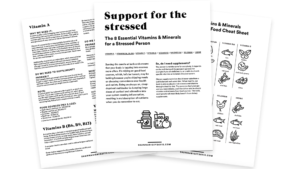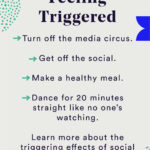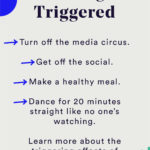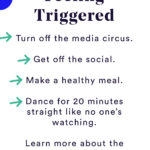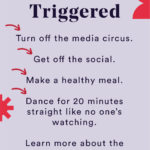I’m super triggered right now, so I thought it would be fitting to do some research. Being triggered is a learning opportunity for us to dig deep and uncover what’s really going on and understand why we are being provoked in the first place. I’m clear on why I am triggered, so I dug a little deeper into the science behind political divides.
TL;DR:
Politics are a type of herding, which we’ve evolved to need for survival. Since we are wired to protect our survival at all costs, politics create an ‘us versus them’ scenario triggering a surge of stress chemicals to help keep us safe. These chemicals force us to look for new threats, which are easy to find when we’re constantly doom-scrolling social media and sucked into 24-hour news cycles. Finding happiness in small, obtainable goals, and safety in familiar social tribes helps us release happiness chemicals, reversing the flight or fight response. Also, sex and chocolate are good.
The brain evolved to promote survival, not happiness.
Your brain evolved to promote survival, so neurochemicals create a sense of urgency to all things related to survival. Your want to fit in and be one with a group feels just as urgent as your immediate physical needs because the legacy of your genes wants to get it on with other genes to live on in a new generation.
We need to be with a group to both survive and thrive. It’s a mammal instinct to belong. Our animal ancestors survived by building social alliances, so we have inherited a brain designed to do that. Politics are a type of herding.
Political alliances feel good because they help you meet those social needs. Your political affiliation stimulates the sense of belonging that makes you feel safe.
Political beliefs are important to our identity, to our sense of who we are. They are part of our social selves as well and can define who we spend time with and how they relate to us. When the brain considers something to be part of itself, whether it’s a body part or a belief, then it protects it in the same way.”
— Jonas Kaplan, an assistant research professor of psychology at USC’s Brain and Creativite Institute, and lead author of the study.

Us over Them
A group of mammals focused on their individual needs is hard to sustain, but common enemies are the glue to any pack. Political leaders keep their herd together by focusing attention on external threats. Them bad, us good.
According to one study, the brain becomes active in regions associated with personal identity, threat response, and emotions when your political views are challenged. In short, it creates a neurochemical roller coaster.
Politics trigger a stress response
When your expectations are being met, happy brain chemicals are released. “Yay, my side is winning!” But when you feel like your happiness is being blocked, the unhappy stress chemicals are released. You see the other side as keeping you from obtaining your goals, and therefore survival. A threat is detected, and alarm bells go off, and along with it, all the hormones and neurotransmitters that make “flight, fight or freeze” possible, including cortisol.
One of the jobs of cortisol is to tell your brain to gather evidence about additional threats. If you’re doom-scrolling or on a 24-hour news cycle, guess what? You’re gathering constant proof that you’re being attacked.
It takes the body about an hour to move from the Alarm Phase (read my post about the 3 Phases of Stress.) If you find new threats in that hour, the stress cocktail continues to pump through your body, creating a loop effect that keeps you in the Resistance Phase keeping an undercurrent of hormones surging, ready for the next threat. This is bad news, friend, because when we stick around in the Resistance Phase, which is meant to be a short stint, we start to race through our internal resources and head towards burnout, or even worse, chronic illness.
So, how do you get out of a stress response? Focus on rewards and happiness instead.
The reward chemicals are dopamine, serotonin, oxytocin, and endorphins, or the feel-good happy chemicals. They are hormones and neurotransmitters involved in lots of essential processes, like heart rate and digestion, and your mood and feelings. They are the reset button. They call off the Alarm Phase and get us back to feeling all sunshine and roses, back to rest and digest again.
Dopamine: The expectation of a reward
Dopamine feels good because it releases energy. It motivates action to meet your needs. Every step closer to a goal of yours stimulates more dopamine. Your brain releases the good feeling with every prediction of a reward — but what if life is unpredictable?
Focus on a goal you can step toward to keep enjoying dopamine. Small steps are sufficient, as long as they are consistent. It’s a good idea to plan short term, middle term, and long term goals so that if any of these are blocked, you can keep the dopamine track running by choosing a new goal to obtain. Even a goal such as “I’m going to walk around the block today” is a worthy one. My favorite book about creating small, obtainable goals is Atomic Habits by James Clear.
Oxytocin: The pleasure of social trust
Oxytocin is only released when you feel safe enough to lower your guard. When you’re separated from the herd, your oxytocin falls. Home alone? Find opportunities to build a tribe, and your brain will reward you with oxytocin.
Serotonin: The great stabilizer
Serotonin is the essential hormone that stabilizes our mood, feelings of well-being, and happiness. This hormone impacts your entire body. It enables brain cells and other nervous system cells to communicate with each other. Serotonin also helps with sleeping, eating, and digestion. Increase this neurotransmitter by eating right, exercising, and getting sunlight.
Endorphins: Nature’s morphine
Endorphins are considered natural painkillers because they activate your opioid receptors, reducing pain and boosting pleasure. The results? A feeling of euphoria and well-being. Endorphins release in response to pain or stress, but they’re also released during other activities, like eating, exercise, or sex. (Which is also why we see a lot of people over-indulging in these particular areas.)
When you’re aware of what’s happening on a body-system level, you can have power over your brain chemicals.
So, how about we try this together:
- Turn off the media circus.
- Get off the social.
- Make a healthy meal.
- And dance for 20 minutes straight like no one’s watching.
Let’s be in each other’s circle.
References to psychologist Loretta Breuning, PhD


